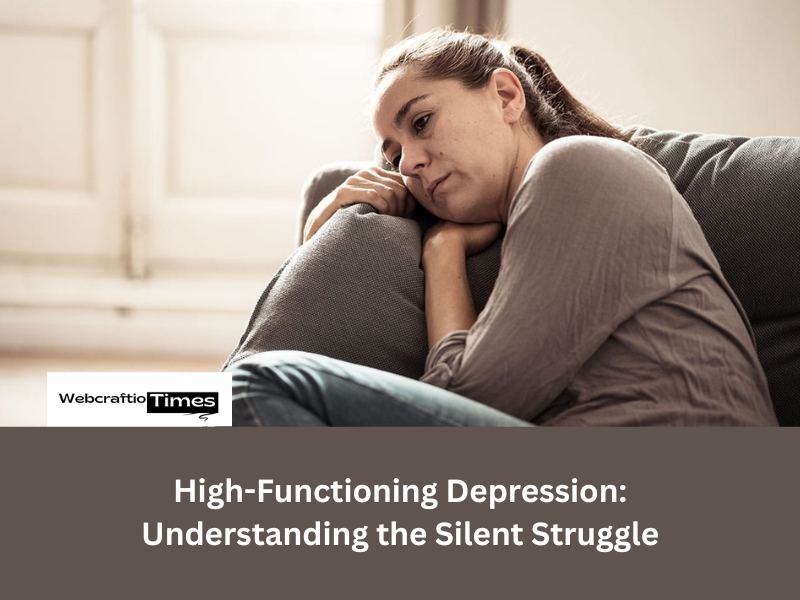Many people picture depression as debilitating sadness. They imagine someone unable to get out of bed. However, depression wears many masks. One of its most deceptive forms is High-Functioning Depression. People with this condition appear successful. They go to work, they manage families, they excel in their lives. Yet, internally, they fight a constant, silent battle. This article explores the hidden nature of High-Functioning Depression. We will uncover its signs. We will also discuss ways to find help. Understanding High-Functioning Depression is the first step to healing.
What is High-Functioning Depression?
You will not find “High-Functioning Depression” in medical textbooks. It is not a formal clinical diagnosis. Instead, professionals often link it to Persistent Depressive Disorder (PDD). PDD, or dysthymia, is a chronic, low-grade depression. It lasts for two years or more. The term High-Functioning Depression describes how some people experience PDD. They manage to function well in daily life. This creates a dangerous paradox. The world sees success. The individual feels only emptiness.
Read More: Negative Effects of Music on Mental Health: Things to Know
Think of an iceberg. People see the small tip of achievement. They do not see the massive body of pain below the surface. A person with High-Functioning Depression might be a top lawyer. They might be a dedicated teacher. They might be a parent who seems to have it all. These achievements hide the truth. The effort to maintain this facade is exhausting. This exhaustion is a key feature of High-Functioning Depression. They use all their energy to perform. They leave no energy for themselves. This condition is a heavy burden.
The Hidden Signs of High-Functioning Depression
Recognizing High-Functioning Depression is difficult. The signs are often subtle. People easily dismiss them as stress or fatigue. Individuals may hide their feelings well. They fear judgment. They fear failure. Look for these persistent patterns.
Constant Doubt and Self-Criticism
People with High-Functioning Depression live with a harsh inner critic. This voice tells them they are not good enough. They may achieve great things. Yet, they feel like frauds. Many call this impostor syndrome. They discount their own success. They attribute it to luck. This relentless self-doubt fuels the High-Functioning Depression.
Persistent Feelings of Sadness or Emptiness
This is not always a powerful, crushing sadness. Often, it is a persistent gray fog. Life loses its color. Activities that once brought joy now feel flat.

This condition, High-Functioning Depression, robs life of its richness. The person feels numb or empty inside. They are just going through the motions.
Hunger and Low Energy
Wearing a mask of success is tiring. Individuals with High-Functioning Depression wake up feeling tired. They push through their day on willpower alone. Their colleagues see them as productive. Their families see them as reliable. By the evening, they collapse. This chronic fatigue is more than just being tired. It is a deep, bone-weary exhaustion.
Irritability and Frustration
When energy is low, patience runs thin. People with High-Functioning Depression may have a short fuse. Small problems feel overwhelming. They may snap at loved ones. They may feel constant frustration. This irritability is often misplaced. The depression is seeking an outlet.
Difficulty Experiencing Real Happiness
A person with High-Functioning Depression can feel happiness. They smile at the right times. They laugh at jokes. Inside, they feel nothing. Good news brings little to no genuine pleasure. This inability to feel joy has a name: anhedonia. It is a core symptom of depression.
Why is High-Functioning Depression So Difficult to Spot?
This condition thrives in secret. Several factors make High-Functioning Depression nearly invisible. First, the individual is a master of disguise. Their success acts as camouflage. People think, “How can they be depressed? They have everything.” Society equates success with happiness. This is a dangerous myth.
Second, stigma still surrounds mental health. A person with High-Functioning Depression fears looking weak. They built their identity on being capable. Admitting their struggle feels like a failure. They worry about their career. They worry about what others will think.
Read More: How to Cure Dog Depression? Dog Depression Remedies Tips
Third, the person minimizes their own pain. They compare their lives to those of others. They think, “I have a good job. I have a family. I have no right to be depressed.” This guilt adds another layer to their High-Functioning Depression. They believe they just need to try harder.
Strategies for Coping and Seeking Help
If this description sounds familiar, please know there is hope. You do not have to fight alone. Coping with High-Functioning Depression starts with one small step.
Acknowledge Your Struggle
The first step is validation. Your feelings are real. Your pain is valid. Success does not make you immune to depression. Accepting that you have High-Functioning Depression is not a weakness. It is an act of profound strength.
Seek Professional Therapy
Talk therapy is highly effective. A therapist can provide a safe space. You can remove the mask. Cognitive Behavioral Therapy (CBT) helps challenge negative thought patterns. A professional understands the nuances of High-Functioning Depression. They can give you tools to cope.
Practice Self-Compassion
You must silence your inner critic. People with High-Functioning Depression are often hard on themselves. Practice self-compassion. Treat yourself with the same kindness you would offer a friend. Perfection is an impossible standard. Allow yourself to be human.
Open Up to Someone You Trust
Isolation fuels High-Functioning Depression. Choose a trusted friend or family member. Share your feelings. You might be surprised. Many people understand more than you think. Saying the words “I am not okay” out loud can be liberating.
Conclusion: Breaking the Silence
High-Functioning Depression is a silent, isolating struggle. It hides behind promotions, achievements, and busy schedules. It proves that what we see on the outside is never the full story. This condition is serious. It deserves attention and care.
If you are struggling, your accomplishments do not cancel your pain. You deserve to feel good. You deserve to find joy. Reach out for help. Talk to a doctor. Find a therapist. Breaking the silence on High-Functioning Depression is the first brave step toward reclaiming your life. You are not alone in this fight.
Frequently asked questions (FAQs)
1. What is High-Functioning Depression?
It’s not a formal diagnosis but a term for individuals who appear successful and capable in their daily lives. Internally, however, they struggle with the chronic, low-grade symptoms of depression, often linked to Persistent Depressive Disorder (PDD).
2. Is High-Functioning Depression a real diagnosis?
No, it is not a formal clinical diagnosis you’d find in a medical textbook. It’s a descriptive term. The official diagnosis most closely related to its symptoms is Persistent Depressive Disorder (PDD), or dysthymia.
3. What are the common signs?
The signs are often subtle. They include constant self-criticism, persistent feelings of emptiness or numbness, chronic exhaustion, irritability, and an inability to feel genuine joy (anhedonia), even when good things happen.
4. Why is High-Functioning Depression so hard to spot?
It’s difficult to recognize because the person’s external success acts as a perfect camouflage. They are masters at hiding their pain, often fearing stigma or feeling guilty that they “shouldn’t” be depressed.
5. How can you get help for it?
Help starts with acknowledging that the struggle is real. Key steps include seeking professional therapy (like CBT), practicing self-compassion instead of self-criticism, and opening up to a trusted friend or family member.



